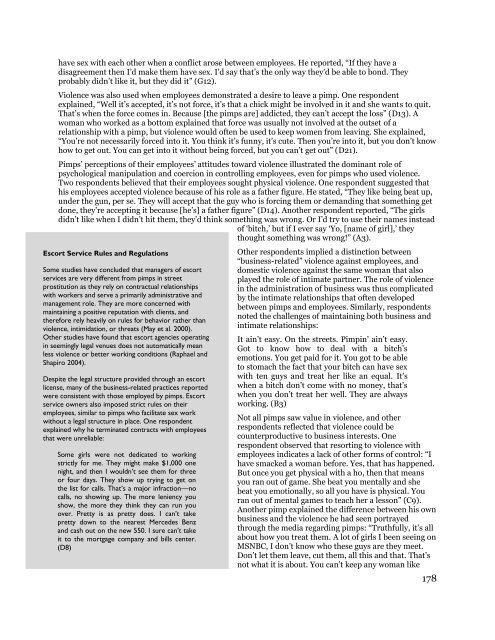413047-Underground-Commercial-Sex-Economy
413047-Underground-Commercial-Sex-Economy
413047-Underground-Commercial-Sex-Economy
Create successful ePaper yourself
Turn your PDF publications into a flip-book with our unique Google optimized e-Paper software.
have sex with each other when a conflict arose between employees. He reported, “If they have a<br />
disagreement then I’d make them have sex. I’d say that’s the only way they’d be able to bond. They<br />
probably didn’t like it, but they did it” (G12).<br />
Violence was also used when employees demonstrated a desire to leave a pimp. One respondent<br />
explained, “Well it’s accepted, it’s not force, it’s that a chick might be involved in it and she wants to quit.<br />
That’s when the force comes in. Because [the pimps are] addicted, they can’t accept the loss” (D13). A<br />
woman who worked as a bottom explained that force was usually not involved at the outset of a<br />
relationship with a pimp, but violence would often be used to keep women from leaving. She explained,<br />
“You’re not necessarily forced into it. You think it’s funny, it’s cute. Then you’re into it, but you don’t know<br />
how to get out. You can get into it without being forced, but you can’t get out” (D21).<br />
Pimps’ perceptions of their employees’ attitudes toward violence illustrated the dominant role of<br />
psychological manipulation and coercion in controlling employees, even for pimps who used violence.<br />
Two respondents believed that their employees sought physical violence. One respondent suggested that<br />
his employees accepted violence because of his role as a father figure. He stated, “They like being beat up,<br />
under the gun, per se. They will accept that the guy who is forcing them or demanding that something get<br />
done, they’re accepting it because [he’s] a father figure” (D14). Another respondent reported, “The girls<br />
didn’t like when I didn’t hit them, they’d think something was wrong. Or I’d try to use their names instead<br />
of ‘bitch,’ but if I ever say ‘Yo, [name of girl],’ they<br />
thought something was wrong!” (A3).<br />
Escort Service Rules and Regulations<br />
Some studies have concluded that managers of escort<br />
services are very different from pimps in street<br />
prostitution as they rely on contractual relationships<br />
with workers and serve a primarily administrative and<br />
management role. They are more concerned with<br />
maintaining a positive reputation with clients, and<br />
therefore rely heavily on rules for behavior rather than<br />
violence, intimidation, or threats (May et al. 2000).<br />
Other studies have found that escort agencies operating<br />
in seemingly legal venues does not automatically mean<br />
less violence or better working conditions (Raphael and<br />
Shapiro 2004).<br />
Despite the legal structure provided through an escort<br />
license, many of the business-related practices reported<br />
were consistent with those employed by pimps. Escort<br />
service owners also imposed strict rules on their<br />
employees, similar to pimps who facilitate sex work<br />
without a legal structure in place. One respondent<br />
explained why he terminated contracts with employees<br />
that were unreliable:<br />
Some girls were not dedicated to working<br />
strictly for me. They might make $1,000 one<br />
night, and then I wouldn’t see them for three<br />
or four days. They show up trying to get on<br />
the list for calls. That’s a major infraction—no<br />
calls, no showing up. The more leniency you<br />
show, the more they think they can run you<br />
over. Pretty is as pretty does. I can’t take<br />
pretty down to the nearest Mercedes Benz<br />
and cash out on the new 550. I sure can’t take<br />
it to the mortgage company and bills center.<br />
(D8)<br />
Other respondents implied a distinction between<br />
“business-related” violence against employees, and<br />
domestic violence against the same woman that also<br />
played the role of intimate partner. The role of violence<br />
in the administration of business was thus complicated<br />
by the intimate relationships that often developed<br />
between pimps and employees. Similarly, respondents<br />
noted the challenges of maintaining both business and<br />
intimate relationships:<br />
It ain’t easy. On the streets. Pimpin’ ain’t easy.<br />
Got to know how to deal with a bitch’s<br />
emotions. You get paid for it. You got to be able<br />
to stomach the fact that your bitch can have sex<br />
with ten guys and treat her like an equal. It’s<br />
when a bitch don’t come with no money, that’s<br />
when you don’t treat her well. They are always<br />
working. (B3)<br />
Not all pimps saw value in violence, and other<br />
respondents reflected that violence could be<br />
counterproductive to business interests. One<br />
respondent observed that resorting to violence with<br />
employees indicates a lack of other forms of control: “I<br />
have smacked a woman before. Yes, that has happened.<br />
But once you get physical with a ho, then that means<br />
you ran out of game. She beat you mentally and she<br />
beat you emotionally, so all you have is physical. You<br />
ran out of mental games to teach her a lesson” (C9).<br />
Another pimp explained the difference between his own<br />
business and the violence he had seen portrayed<br />
through the media regarding pimps: “Truthfully, it’s all<br />
about how you treat them. A lot of girls I been seeing on<br />
MSNBC, I don’t know who these guys are they meet.<br />
Don’t let them leave, cut them, all this and that. That’s<br />
not what it is about. You can’t keep any woman like<br />
178


